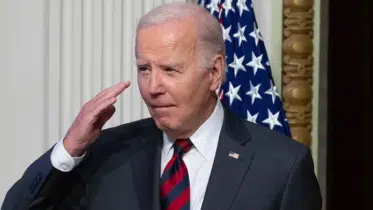By Jaymie Baxley
A federal program that provided subsidized internet access to low-income families is expected to end on Friday, affecting more than 900,000 households in North Carolina.
Created through the federal 2021 infrastructure law, the Affordable Connectivity Program was touted by the Biden administration as the “largest high-speed internet affordability” initiative in American history when it launched. People who met the program’s income-based eligibility requirements saved at least $30 a month on broadband internet, a discount that effectively made the service free for many participants.
The program saw wide adoption in North Carolina, which in February had the nation’s ninth-largest percentage of ACP enrollees in the country. One in five households across the state were enrolled, according to the Federal Communications Commission.
However, the initial $14.2 billion in funding for the program has run out. April was the last fully funded month for the ACP, and participants received only partial benefits in May. Their discounts will disappear completely next month if Congress fails to act by the end of the week.
Without the subsidies, people who rely on high-speed internet for health care services may be forced to disconnect. Experts say the loss of the ACP would be particularly harmful to telehealth patients in marginalized communities who often face physical and financial barriers to in-person care.
Democrats in North Carolina’s U.S. House delegation want the ACP to continue. All seven of them co-sponsored a bill to extend the program through the end of the year, and several reaffirmed their stance in statements to NC Health News.
Their Republican counterparts in the House have been more opaque. None of them signed the extension bill — which is backed by two dozen Republicans from other states — and none of them responded to multiple messages asking where they stand on the program’s fate.

The lack of public support from North Carolina’s seven Republican representatives, five of whom are seeking reelection in November, could be considered surprising, given the program’s popularity among their constituents. An analysis by NC Health News found that 53 percent of the state’s ACP-enrolled households are in Republican-led congressional districts.

Failure to progress
U.S. Rep. Kathy Manning (D-N.C.06) said the program has provided “a lifeline for many hardworking families” in North Carolina. More than 80,000 households in her district are enrolled.
“All across the district, we get calls from parents, from small business owners, from community colleges, from educators, from health care professionals who tell us the same thing: The ACP is vital to their communities,” Manning said during a news conference on May 10, adding that the program’s demise would cause participants’ “internet costs to rise at a time when people are already struggling with rising food costs, rising rent and rising housing costs.”
Manning said the extension bill has failed to move forward because House Speaker Mike Johnson has not brought it to the floor for a vote. With 230 co-sponsors, the bill appears to have enough support to pass in the House of Representatives and move to the U.S. Senate.
“I will continue to do everything I can in Congress to fight to fully fund this program — and to urge the Speaker of the House to bring that bill to the floor and allow us to take a vote,” Manning said. “If we are able to do that, I am quite confident the program will be extended because nobody, no matter what party they’re from, [is] going to want to stand up on the House floor and vote against helping our constituents have an ability to access affordable internet.”
Her comments came just two days after Reps. Don Davis (D-N.C.01) and Deborah Ross (D-N.C.02) sent a letter to Johnson and other congressional leaders urging them to “prioritize a funding extension for the Affordable Connectivity Program using any upcoming legislative vehicle.”
“If funding for this critical program is allowed to lapse, hundreds of thousands of our constituents risk losing access to high-speed internet at a time when they increasingly rely on this connection to get an education, provide for their families, access health care, and participate in our democracy,” they wrote.
The call for action was echoed by Reps. Valerie Foushee (D-N.C.04) and Wiley Nickel (D-N.C.13), who together represent more than 115,000 households served by the ACP.
Even if the extension bill passes the House, it is unclear if North Carolina’s two Republican U.S. senators would support it. When asked for comment, Sen. Thom Tillis provided a statement that did not indicate whether he is in favor of continuing the program.
“The people of North Carolina sent me to the United States Senate with a mandate to work with my colleagues in good faith to produce results for our state,” Tillis wrote. “I remain committed to bridging the urban-rural digital divide and will continue to work with my colleagues on both sides of the aisle to ensure all North Carolinians have access to internet service, regardless of ZIP code.”

Other ways to save
Some North Carolina families may be eligible for other discounts on broadband service if the ACP ends.
Lifeline is a federal benefit that can reduce consumers’ internet bills by $9.25 a month, or $34.25 a month if they live on Tribal lands. To qualify, a person must have an annual income that does not exceed 135 percent of the federal poverty level for their household size — about $34,857 a year for a family of three — or be enrolled in another assistance program like Medicaid or SNAP.
Spectrum, the state’s largest high-speed internet provider, offers discounted plans for subscribers with household members who receive Supplemental Security Income or participate in the National School Lunch Program. The plans cost $25.99 a month, although the price is subject to change.
But these alternatives are not as inclusive as the ACP, which was open to residents who already qualified for programs like Lifeline or whose incomes fell within 200 percent of the federal poverty level ($31,200 for a family of four).
There is a possibility that the program might return or be replaced by a similar benefit in the coming months.
Sara Nichols, a senior planner for the Land of Sky Regional Council, went before federal lawmakers in September to advocate for the continuation of the ACP. In a recent interview with NC Health News, she predicted that funding for the program would not be extended before Friday’s deadline.
“I don’t have a lot of confidence that we’ll find a solution by the time this funding runs out,” she said. “I have more confidence that we will see another solution at some point, maybe after the election.”











